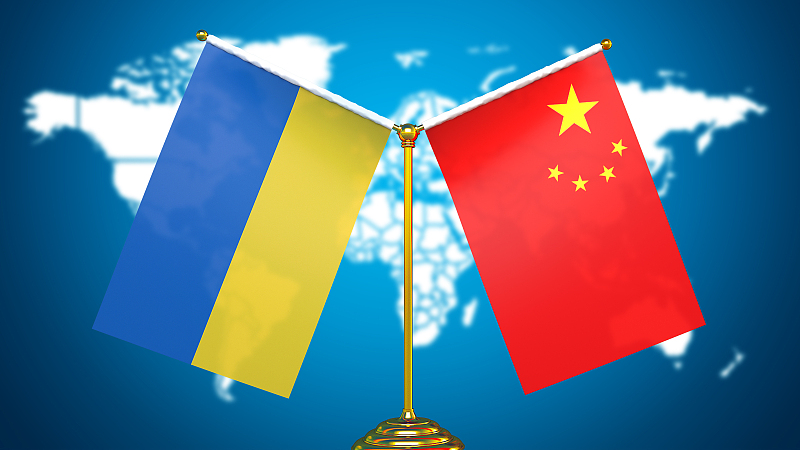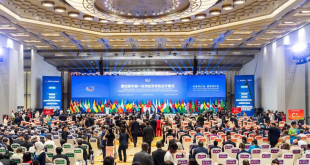Published: May 06,2023
By John Gong

National flags of China and Ukraine. /CFP
A wave of diplomatic activities steered by China’s Ministry of Foreign Affairs has generated such a basket of pleasantly surprising successes that can be described as a “peace tsunami.” It’s obvious that peace is finally descending on lands and among peoples that have fought against each other for decades. Peace is transcending bickering differences in ethnicity, political system and religious belief for centuries, particularly in the Middle East.
The Middle East has seen its share of conflicts and wars in the past between or among different parties. But now we are seeing what I call the great rapprochement among several countries. After years of hostility that fuelled other conflicts in the Middle East, Saudi Arabia and Iran finally agreed to reestablish diplomatic relations in a deal facilitated by China last month.
On April 6, both foreign ministers of Saudi Arabia and Iran stood on the two sides of China’s Foreign Minister Qin Gang in Beijing for the first formal gathering between the two countries in more than seven years.
The rapprochement between the greatest Sunni power and the greatest Shia power is immediately resonated among other countries in the region close to each camp. The very next day after Saudi Arabian and Iranian foreign ministers met in Beijing saw the announcement of a cease-fire extending through 2023 from the two warring sides in Yemen, thanks to China’s effort between Saudi Arabia and Iran, which have been engaging in a proxy war in Yemen for years. It now looks like the war is coming to an end.
Chinese State Councilor and Foreign Minister Qin Gang meets with Saudi Arabian Foreign Minister Prince Faisal bin FarhanAl Saud and Iranian Foreign Minister Hossein Amir-Abdollahian in Beijing, capital of China, April 6, 2023. /Xinhua
On April 13, Bahrain and Qatar agreed to restore diplomatic relations. Bahrain was the last holdout of the four Arab nations that imposed a boycott on Qatar in 2017 as a part of a Saudi-led feud with Qatar.
Furthermore, partly thanks to China’s effort, Syria appears to be returning to the Arab fold, being the last holdout after other Arab states including UAE, Algeria, Bahrain, Egypt, Oman, and Jordan having re-established relations with Syria, finally followed suit.
Yet, how can the great, or the greater, peace process in the Middle East proceed without the presence of Israelis and Palestinians? Well, on April 17, Foreign Minister Qin Gang conducted two separate phone calls respectively with his Israeli and Palestinian counterparts, telling them that Beijing is ready to help facilitate peace talks between the two sides.
Peace negotiations between Israel and Palestine in Beijing would be quite a spectacle. Given my understanding of the Israeli politics, although whether or not the negotiations will take place remainunknown, even a minimal prospect of talks between the two sides would be worth pursuing for the sake of a peaceful Middle East.
Finally, it’s of great importance when hour-long phone talks were held between Chinese President Xi Jinping and the Ukrainian President Volodymyr Zelenskyy, during which the Chinese side promised concrete steps to take up the role of mediator for the conflict in Ukraine. President Zelenskyy put up an upbeat tweet immediately afterwards, followed by welcomes across Europe, and noticeably by Washington as well.
These remarkable developments towards peace emanating from Beijing are resounding evidences that China’s foreign policy is genuinely striving for peace, as it pushes forward the vision of a community with a shared future for mankind. China is now the world’s second largest economy, and it is able to grow to the current stage with an indispensible peaceful environment around it. Hopefully Beijing’s peace campaign will lead to something in Ukraine.
John Gong is a professor at the University of International Business and Economics (UIIBE) and VP- Research and Strategy at the UIBE-Israel.
cgtn.com
na
By John Gong
National flags of China and Ukraine. /CFP
A wave of diplomatic activities steered by China’s Ministry of Foreign Affairs has generated such a basket of pleasantly surprising successes that can be described as a “peace tsunami.” It’s obvious that peace is finally descending on lands and among peoples that have fought against each other for decades. Peace is transcending bickering differences in ethnicity, political system and religious belief for centuries, particularly in the Middle East.
The Middle East has seen its share of conflicts and wars in the past between or among different parties. But now we are seeing what I call the great rapprochement among several countries. After years of hostility that fuelled other conflicts in the Middle East, Saudi Arabia and Iran finally agreed to reestablish diplomatic relations in a deal facilitated by China last month.
On April 6, both foreign ministers of Saudi Arabia and Iran stood on the two sides of China’s Foreign Minister Qin Gang in Beijing for the first formal gathering between the two countries in more than seven years.
The rapprochement between the greatest Sunni power and the greatest Shia power is immediately resonated among other countries in the region close to each camp. The very next day after Saudi Arabian and Iranian foreign ministers met in Beijing saw the announcement of a cease-fire extending through 2023 from the two warring sides in Yemen, thanks to China’s effort between Saudi Arabia and Iran, which have been engaging in a proxy war in Yemen for years. It now looks like the war is coming to an end.
Chinese State Councilor and Foreign Minister Qin Gang meets with Saudi Arabian Foreign Minister Prince Faisal bin FarhanAl Saud and Iranian Foreign Minister Hossein Amir-Abdollahian in Beijing, capital of China, April 6, 2023. /Xinhua
On April 13, Bahrain and Qatar agreed to restore diplomatic relations. Bahrain was the last holdout of the four Arab nations that imposed a boycott on Qatar in 2017 as a part of a Saudi-led feud with Qatar.
Furthermore, partly thanks to China’s effort, Syria appears to be returning to the Arab fold, being the last holdout after other Arab states including UAE, Algeria, Bahrain, Egypt, Oman, and Jordan having re-established relations with Syria, finally followed suit.
Yet, how can the great, or the greater, peace process in the Middle East proceed without the presence of Israelis and Palestinians? Well, on April 17, Foreign Minister Qin Gang conducted two separate phone calls respectively with his Israeli and Palestinian counterparts, telling them that Beijing is ready to help facilitate peace talks between the two sides.
Peace negotiations between Israel and Palestine in Beijing would be quite a spectacle. Given my understanding of the Israeli politics, although whether or not the negotiations will take place remainunknown, even a minimal prospect of talks between the two sides would be worth pursuing for the sake of a peaceful Middle East.
Finally, it’s of great importance when hour-long phone talks were held between Chinese President Xi Jinping and the Ukrainian President Volodymyr Zelenskyy, during which the Chinese side promised concrete steps to take up the role of mediator for the conflict in Ukraine. President Zelenskyy put up an upbeat tweet immediately afterwards, followed by welcomes across Europe, and noticeably by Washington as well.
These remarkable developments towards peace emanating from Beijing are resounding evidences that China’s foreign policy is genuinely striving for peace, as it pushes forward the vision of a community with a shared future for mankind. China is now the world’s second largest economy, and it is able to grow to the current stage with an indispensible peaceful environment around it. Hopefully Beijing’s peace campaign will lead to something in Ukraine.
John Gong is a professor at the University of International Business and Economics (UIIBE) and VP- Research and Strategy at the UIBE-Israel.
cgtn.com
 Africa -China Review Africa -China Cooperation and Transformation
Africa -China Review Africa -China Cooperation and Transformation
